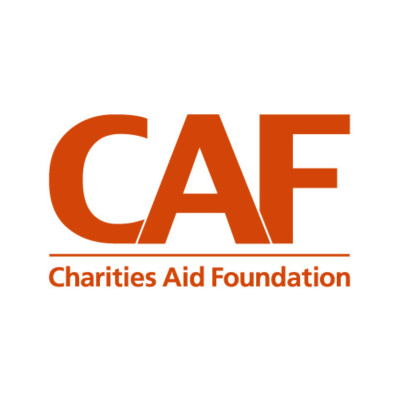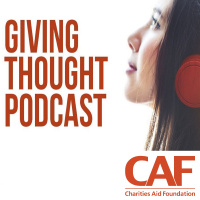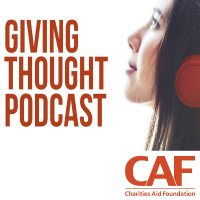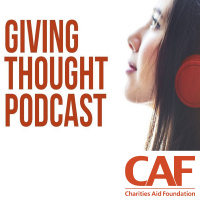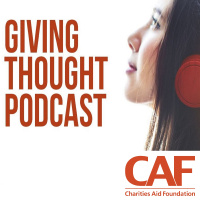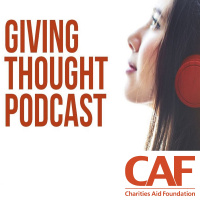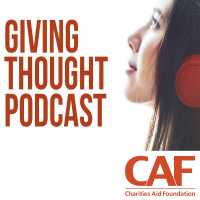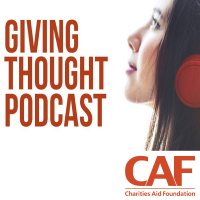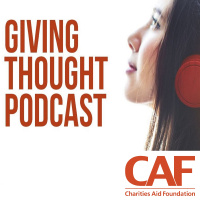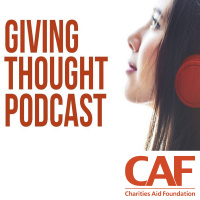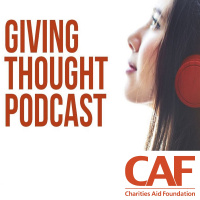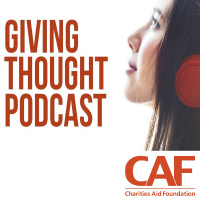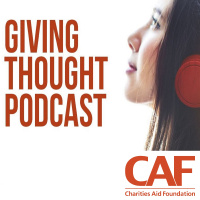Synopsis
Here goes nothing! We are pleased to launch the Giving Thought Podcast, brought to you by the Charities Aid Foundation's in house think-tank Giving Thought.In our first episode, we will be looking at the interplay between philanthropy, charity and politics. Given recent political events around the world and the trend for civil society activism to singled out for special scrutiny for its political influence this seems timely.We have decided to look at this issue from three interesting angles; Scrapping the Johnson amendment: What if President Trump follows through on his pledge to "destroy" the Johnson amendment which restricts the political lobbying of non profits and religious organisations? The emerging legal environment for Chinese civil society: New laws have made life much easier for donors and charities to operate ... as long as you agree with the government. Fake News: The proliferation of false stories targeted at specific audiences online raises problems for charities in getting their message across but also new needs for them to address. Read related content from Giving ThoughtAlgorithm Is Gonna Get You: what the rise of algorithms means for philanthropyAlgorithms are the automated decision processes that increasingly govern many aspects of our lives and the choices we make.Truth Decay: Philanthropy and the battle against misinformation and fake newsDoes philanthropy have a vital role to play in combating the widely-publicised threat of fake news?
Episodes
-
2020 Predictions for Philanthropy & Civil Society
07/01/2020 Duration: 38minHappy New Year! In episode 63, we gaze into our crystal ball and proffer some predictions for what the first year of the new decade might hold for philanthropy and civil society. Including: Politics & Economics Greater UK political stability? (i.e. political landscape now fixed for 5 yrs) Increased or reduced division? (i.e. post-Brexit healing, or ongoing animosity?) Focus on service delivery rather than campaigning? International development & aid under fire? Localism and devolution? US election- big impact, whatever the result Environment Increasing focus and sense of urgency UK hosting 2020 UN Climate Summit (Glasgow) More prevalent sense that environmental issues are cross-cutting and therefore the concern of all CSOs/funders Increasing pressure on charities/funders to demonstrate environmental commitment Tech More commercial platforms adding giving functionality Deepfakes and challenges to online authenticity Surveillance tech and civil liberties/human rights Centralised cryptocurre
-
Andrew Rudd- Charity & Philanthropy in Literature
10/12/2019 Duration: 53minIn episode 62, we chat to Andrew Rudd from the University of Exeter about representations of charity and philanthropy in literature and how literature and the humanities can inform practice. Including: Which famous authors and poets have written about charity issues? What are some of the main positive themes about charity & philanthropy that can we identify in literature? What are some of the key critical themes about charity & philanthropy that can we identify in literature? What have famous writers said about the distinction between charity and justice? The tension between head and heart, between an emphasis on empathy and rationality, has long been a major source of debate within charity. What has literature had to say about it? What was Dicken’s notion of “telescopic philanthropy” and why does it remain pertinent to debates about international aid today? The idea of poorly-aimed, ‘indiscriminate’ charity that perpetuates poverty and reliance has been a huge source of concern for many throughout h
-
The ARNOVA 2019 conference: Reflections on Academia & Practice in Philanthropy and Civil Society
27/11/2019 Duration: 52minIn episode 61, Rhod reports back on a recent trip to the 48th annual ARNOVA conference in San Diego - one of the main global events for philanthropy and non-profit researchers. Including: What were the key themes being discussed at the conference? What came up in the main plenary debate on “promises and perils of philanthropy in a polarized world?” Highlights from other paper sessions and debates, including: Findings on public trust Young people’s attitudes to charity representations on social media A fascinating historical example of radical movement funding How representative bodies can shape our understanding of what the charity sector is. How much do US non-profit issues and critiques apply elsewhere? What can we do to connect the academic study of philanthropy better with practice and policy? How can academics get better at disseminating their work to practitioners, and how can practitioners get better at paying attention to academia? Is there an important role for non-profit “think tanks” in bridgi
-
Philanthropy, Diversity & Inclusion
12/11/2019 Duration: 59minIn episode 60 we look at the relationship between philanthropy, diveristy and inclusion, and in particular at what we can learn from the historic role that philathropy has played in campaigns for social change about some of its strengths and weaknesses when it comes to driving greater diversity and inclusion. Including: Overcoming the ‘tyranny of the majority’: philanthropy and civil society plurality as a means of giving voice to minorities Is philanthropy particularly good at accepting the political and reputational risks required to support unpopular or marginalised causes and bring them into the mainstream? Does philanthropy have a longer-term time horizon than the public or private sector, and does this make it better at sticking with issues? Does the fact that philanthropy is not accoutable to voters or shareholders make it able to take the risks necessary to drive social change? Why should we be alarmed about suggestions that philatropy should be measured against public opinion? Can appreciating the
-
Beth Kanter - Nonprofit digital transformation & Artificial Intelligence
29/10/2019 Duration: 55minIn episode 59 we talk to speaker, author and expert on all things non-profit digital, Beth Kanter, about the impact of technology on non-profits and the challenges and opportunities that Artificial Intelligence (AI) will bring. Including: Has social media changed the game for nonprofits in terms of how they communicate? Have some of these tools levelled the playing field between big and small (or well-known and obscure) organisations? How well-equipped are nonprofits to take advantage of the potential of digital? If some organisations are struggling, what are the key barriers? Is there a danger that social media and online discourse create perverse incentives to sensationalise or simplify issues, because everyone is competing for scarce attention? Does this present a particular challenge for nonprofits? If digital tools enable people to form groups easily and organise in new ways, does this make traditional nonprofits less relevant as people look to networked models of social change? How can traditional nonp
-
Jim Minton - Place-based philanthropy in London
15/10/2019 Duration: 47minIn episode 58 we talk to Jim Minton, CEO of Toynbee Hall- the UK's oldest university settlement and an East End of London institution that has also played a key role in wider social reforms. We discuss the role of local civil society organisations and the opportunities and challenges that come with place-based philanthropy. Including: The history of Toynbee Hall Are enough charities today playing a role as drivers of social reform? Have recent changes such as the Lobbying Act or the use of advocacy clauses in grant contracts made this harder? Can the successes of place-based initiatives inform activities or policymaking at a regional or national level? How can organisations based in one place ensure they ‘influence upwards’? Is “place” more complex than it is sometimes presented? I.e. at what geographic level do we feel a sense of belonging or identity? How do you coordinate philanthropy and voluntary action in a particular place without stifling it? Are place-based organisations particularly well-suited to
-
Rose Longhurst - Participatory Philanthropy
23/09/2019 Duration: 01h03minIn episode 57, we talk to Rose Longhurst about participation in philanthropy and her experience of radical approaches to grantmaking with Edge Fund (and others). Including: What is Edge Fund, how did it come about, and what are its aims? Where does Edge Fund fit in the wider landscape of participatory grantmaking? How does its approach help to overcome some of the concerns about existing models of philanthropy? i.e. that they are undemocratic, that they fail to redistribute power, that they are incapable of addressing structural inequality? Could more traditional funders replicate the Edge Fund approach? Which elements? And what would they need to change in order to make this happen? There is a lot of focus on participatory approaches to grantmaking at the moment as part of the solution to the criticisms being levelled at philanthropy. How much of the rhetoric is reflected in reality? Are there limits to participatory grantmaking? i.e. are there some situations in which it is better for expert funders to set
-
Tainted Donations
17/09/2019 Duration: 51minIn episode 56 we take a deep dive into the issue of "tainted donations". Is some money "bad", and if so can it ever be turned to good uses through philanthropy? Including: Recent versions of the tainted donation issue: Epstein & MIT Media Lab, the Sacklers, The Presidents Club The history of tainted donations: mediaeval prostitutes, Rockefeller & Carnegie in the firing line, George Cadbury, George Bernard Shaw, William Booth What do we mean by tainted? In cases where there is no clear illegality, how do we navigate much more contested ethical grey areas? Do we need to differentiate between criticisms of specific ways in which has been made (e.g. fossil fuels, arms manufacture, tobacco) and broader structural critiques of capitalism as a whole? Do the ethical concerns associated with a particular source of money relate directly to the way in which the money was made, or are they indirect? Does this affect the moral status of a donation? In a highly interconnected world, with global financial systems,
-
Julia Unwin - Civil Society: Now & in the Future
03/09/2019 Duration: 54minIn episode 55, we talk to Julia Unwin CBE, Chair of the Independent Inquiry into Civil Society Futures, former CEO of the Joseph Rowntree Foundation and Joseph Rowntree Housing Trust and prolific thinker and writer on issues affecting civil society. As part of a wide-ranging conversation, we discuss: What is the Civil Society Futures Inquiry & how did it come about? What is the PACT framework and how is it intended to guide civil society orgs in the future? There is a lot of interest at present in ‘place-based’ approaches. Why is this, and what is the power of place? We are seeing the emergence of new organisational models within civil society, including many that look less like traditional hierarchies and more like networks. What opportunities and challenges might this bring? We are also seeing new approaches such as participatory grantmaking, which seek to shift power as well as money towards recipients, gain traction? Will this be a big trend in coming years? Do charities and funders need to be more t
-
Effective Altruism
23/07/2019 Duration: 48minIn episode 54, we take a look at Effective Altruism. Why has this approach to philanthropy based on utilitarian philosophy gained so many admirers - and so many critics - over the last few years? Including: -What is Effective Altruism (EA)? -How is it informing new approaches to philanthropy? -Why are so many tech philanthropists EA advocates? -Could the emergence of data-driven, AI approaches to philanthropy put EA in the driving seat? -What is the historical lineage of Utilitarian thinking? -What role did religion play in giving birth to the idea that philanthropy needs to be effective? -How did the Charity Organization Society and the Scientific Philanthropy movements take this idea forward, and are they the intellectual forebears of EA? -What, if anything, is genuinely new about EA? -Is EA merely theoretical because it doesn't reflect how philanthropy actually works or what motivates donors? -Does the focus on outcomes come at the expense of other considerations such as justice, democracy or individual
-
Structure and Philanthropy
09/07/2019 Duration: 55minIn episode 53, we look at structure and philanthropy. Exploring how philanthropy and civil society has become structured over time, what the drivers for this are, and what new possibilities the future may hold. Including: The reformation and the dismantling of medieval catholic infrastructure for giving Urbanisation, poverty and associated philanthropy The charitable/philanthropic tradition vs the mutual/cooperative tradition in the UK Concerns about 'faction' and voluntary association in the US Benefits of structure: coordination, economies of scale, setting and maintaining strategy, separating the individual from their role, making rules explicit Structure and power: formalisation as a form of social control? Endowed structures: foundations, trusts and waqfs Nonprofit and charity structures in the UK and US Donor Advised Funds and Charitable Remainder Trusts Non-traditional structures: LLCs, B Corps etc. Disintermediating giving: direct cash transfers and crowdfunding Network social movements and the "Tyr
-
Philanthropy & Public Space
25/06/2019 Duration: 51minIn episode 52, we take a look at the relationship between philanthropy and public space. How has philanthropy shaped our understanding of public space, and what role does public space play in driving philanthropy? Including: Philanthropy and rural public space The role of philanthropy and voluntary action in shaping the development of national parks in the UK and US The history of the National Trust and what it can teach us about the tension between preservation and access Urban parks & greenspace in the UK Public parks philanthropy in the US- success and controversy. How do we ensure that public spaces near where rich people live aren’t supported at the expense of those in less well-off neighbourhoods? Non-green urban public space: sport facilities and community buildings Public space and bridging social capital Does the emergence of quasi-public spaces owned and controlled by the private sector raise new challenges for philanthropy and civil society? Philanthropy and the concept of the public sphere Di
-
Philanthropic Pledges
10/06/2019 Duration: 46minIn episode 51, we explore philanthropic pledges: what are they, do they work and how have they been used to drive more and better giving? Including: Mackenzie Bezos’ recent decision to join the Giving Pledge has been widely reported. But how successful has this initiative been overall? Who are the notable signatories and the notable absences from the Giving Pledge? Why have some people not signed? Has the Giving Pledge shifted the level of giving by the ultra wealthy? Has it had any impact on overall levels of giving? What can we learn from the pledge letters of GP signatories? Does the GP lack the tools to hold signatories to their pledges? Should it? Is the GP’s scope less radical than it might have been, and why? What of other pledge initiatives like the Founders Pledge? Does a pledge represent an expectation that a certain level of wealth comes with responsibilities to give, or is it entirely voluntary? What does academic research tell us about the economics and psychology of pledges? Why are the conce
-
Phil Buchanan- Effective Giving & Being Positive About Philanthropy
28/05/2019 Duration: 53minIn episode 50, we talk to Phil Buchanan- founding CEO of the Center for Effective Philanthropy and author of a new book: Giving Done Right: Effective Giving and Making Every Dollar Count. We discuss current debates about philanthropy and what we need to do to ensure a positive narrative about the value of giving in our society as we head into the future. Including: What is the core role of philanthropy within society which differentiates it from either state or market provision? A key strength of philanthropy is often argued to be its ability to drive society forward by taking risks and funding things that the state or market cannot - but how much current philanthropy actually lives up to this billing? Why has the idea that non-profits need to be “more business-like” become so widespread, and why is it wrong? One of the effects of taking an “investment approach” is that donors can then be reluctant to fund core costs or to give unrestricted funding- why is this such a problem? Is part of the problem with t
-
Notre Dame: Lessons for Philanthropy
14/05/2019 Duration: 52minIn episode 49, we explore some of the issues brought to light by the recent devastating fire at Notre Dame Cathedral in Paris and the immediate philanthropic response. Including: -Does the Notre Dame response demonstrate there is untapped philanthropic potential out there? -Why will people respond so readily to a damaged building, but ongoing efforts to address issues of human poverty and suffering remain hard to fundraise for? -Does this story illustrate that philanthropy is inherently irrational? If so, what should our conclusion be? -What is it about the Notre Dame disaster that has brought about such an unprecedented response? -Should we be grateful to the mega-donors who have pledged millions to Notre Dame, or ask what they are getting in return in terms of social status and legitimacy? -Do we need to scrutinise the source of wealth of these mega-donors, and whether they have paid their fair share of tax, and balance this against their desire to do good through giving? -If we agree that rebuilding Notr
-
Megan Ming Francis- Philanthropy, Civil Rights & Movement Capture
23/04/2019 Duration: 44minIn episode 48 we talk to Megan Ming Francis, Associate Professor in the Department of Political Science at the University of Washington, about her recent paper “The Price of Civil Rights: Black Lives, White Funding and Movement Capture” and her wider work on the role of philanthropic funders in supporting the civil rights movement. Including: Is “movement capture” something that reflects a deliberate desire on the part of funders to change the goals or strategic focus of grantees, or is it just an inevitable consequence of the power imbalance in the funder/recipient dynamic? Does the legitimacy that funders are able to offer to radical causes add to the power imbalance? Is the imbalance between funder and grantee particularly striking in the case of the NAACP in the early C20th, given the racial division and the background context of Jim Crow? Can grantees be “victims of their own success” if they make headway on radical causes using novel techniques (as the NAACP did on the issues lynching using legal chall
-
Paul Ramsbottom- Foundations & Endowed Philanthropy
09/04/2019 Duration: 52minIn episode 47 we talk to Paul Ramsbottom, CEO of the Wolfson Foundation, about foundations and endowed philanthropy. Including: What is the core role of philanthropy within society which differentiates it from either state or market provision? What is the particular role of foundations/endowed philanthropy in that mix? Is the ability to take a long-term view that comes with endowment better than the sense of urgency that comes with taking a spend-down approach, or are they just different? If there is room for both approaches, what criteria might determine the choice of approach? Do foundations need to be more transparent? If so, why and about what? Who does it benefit (the foundations themselves, their donors, grantees, taxpayers etc) Are there arguments against transparency? What tensions or power dynamics can there be when a foundation has been established by an individual or single family (and they are still involved), between those founders and the staff of the organisation? Does the way in which money h
-
Sameer Padania - Philanthropy & Journalism
26/03/2019 Duration: 01h01minIn episode 46, we talk to Sameer Padania about Philanthropy & Journalism. We ask why the media is looking to philanthropy as a source of funding; why philanthropic funders are interested in supporting journalism; and what challenges and opportunities this might bring. Including: Why has journalism come to the attention of funders and philanthropists recently? How are funders and CSOs using journalism to further their causes? How many funders see journalism and a free press as an important public good in and of themselves, and are thus willing to fund general journalism? What role could philanthropic funding for news media play in addressing problems like targeted online misinformation and the erosion of public discourse online? What should we make of the rise of non-profit newsrooms like ProPublica? Is the reader voluntary subscription model taken by the Guardian etc. is better than relying on a single major donor? What approaches are philanthropic funders taking to supporting news media? Is there a cha
-
Beth Breeze - Studying & Teaching Philanthropy
12/03/2019 Duration: 44minIn episode 45, we chat to Beth Breeze- Director of the Centre for Philanthropy at the University of Kent- about studying and teaching philanthropy as an academic discipline. Including: -Why is it important for philanthropy to be seen as a subject of academic study? -What does a philanthropy researcher actually do? -Does philanthropy suffer from being cross-disciplinary, so that it doesn’t fit neatly into traditional academic siloes? -How can the academic study of philanthropy effectively influence practice and policymaking? -Why is teaching philanthropy important? What is the profile of a typical student, and what do they learn? -Why has the fundraising side of the philanthropy equation been so overlooked? -What makes a good fundraiser? -Does the UK need more professionalised major donor fundraising if we are to drive more philanthropy? -Do the current critiques of philanthropy in the US ring true in the UK? Is there a danger that they will exacerbate a negative perception of philanthropy? -Is “Philanthropy”
-
Women and Philanthropy
26/02/2019 Duration: 49minIn episode 44, to celebrate International Women’s Day on the 8th March, we take a look at “Women and Philanthropy”. Exploring famous female philanthropists past and present, the role that charitable work has played in the emancipation of women, and the ways in which philanthropy has been used as a tool to fight for women’s rights. Including Fascianting female philanthropists from history: Angela Burdett Coutts, Octavia Hill, Olivia Russell Sage, Beatrix Potter, Jenny Lind and Madam CJ Walker The importance of philanthropy as a bridge between the domestic sphere and the public sphere and the role it therefore played in changing women’s perceptions of their own capacities & changing mens’ perception of the role of women. Philanthropy as an outlet for the misery and frustration of Victorian women Is there such as a thing as “feminine” philanthropy? Philanthropy and the women’s suffrage movement Philanthropy and the women’s anti-suffrage movement Philanthropy, women’s liberation & feminismn in the 1960
